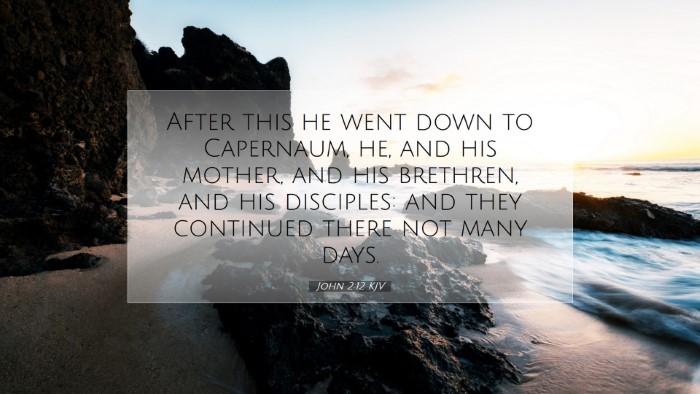Old Testament
Genesis Exodus Leviticus Numbers Deuteronomy Joshua Judges Ruth 1 Samuel 2 Samuel 1 Kings 2 Kings 1 Chronicles 2 Chronicles Ezra Nehemiah Esther Job Psalms Proverbs Ecclesiastes Song of Solomon Isaiah Jeremiah Lamentations Ezekiel Daniel Hosea Joel Amos Obadiah Jonah Micah Nahum Habakkuk Zephaniah Haggai Zechariah MalachiJohn 2:12
John 2:12 KJV
After this he went down to Capernaum, he, and his mother, and his brethren, and his disciples: and they continued there not many days.
John 2:12 Bible Commentary
Commentary on John 2:12
John 2:12 states, "After this he went down to Capernaum, he, and his mother, and his brethren, and his disciples: and they continued there not many days." This verse serves as a transition in the Gospel of John, illustrating the movements of Jesus and the close circle around Him. It invites deep reflection and analysis.
Contextual Overview
To properly understand this passage, one must consider its context within the broader narrative of the Gospel. The preceding account in John 2:1-11 describes the miraculous transformation of water into wine at the wedding in Cana, marking the first of Jesus’ signs, revealing His divine authority and the nature of His ministry. Following this, the mention of Capernaum is significant not only geographically but thematically as it aligns with the commencement of His public ministry.
Insights from Matthew Henry
Matthew Henry, in his well-known commentary, emphasizes that Capernaum becomes a central hub for Jesus' ministry following the Cana event. His commentary notes:
- The Importance of Capernaum: Henry observes that Capernaum was not merely a location; it was chosen because of its strategic significance. It acted as a launch point for Jesus’ later miracles and teachings.
- The Company of Jesus: He highlights the presence of Mary, the brothers of Jesus, and His disciples, indicating the importance of close relationships in building the early Christian community.
- Temporal Nature of Their Stay: The phrase "not many days" signifies both the transient nature of Jesus' ministry and foreshadows the urgency of His mission.
Insights from Albert Barnes
Albert Barnes provides a detailed exegesis on this passage, focusing on the implications of Jesus’ journey to Capernaum:
- Descending to Capernaum: Barnes emphasizes the physical act of ‘going down’ as both a literal and metaphorical descent, illustrating the humility of Christ as He moves from a joyful celebration to an area that would face His profound teachings.
- Family and Discipleship: He further discusses the mention of Jesus' mother and brethren, arguing that it was critical for establishing Jesus’ human connections while recognizing His divine mission.
- Implication of Their Duration: They stayed a short time, indicating the anticipation of wider travels and significant ministry ahead.
Insights from Adam Clarke
Adam Clarke’s commentary provides additional depth, particularly in regard to the social dynamics at play:
- Cultural Relevance: Clarke points out the cultural aspects of Jesus' family relationships, arguing that the acceptance of His brothers and mother played a crucial role in shaping His identity as the Messiah among Jewish society.
- Public Perception: He posits that this early gathering and the eventual public perception of Jesus were intricately woven with the presence of family, lending credibility and familiarity to an often skeptical audience.
- Ministry Preparation: This period in Capernaum can be viewed as a preparatory phase for the ministry that would soon unfold, demonstrating the necessity of companionship and community.
Theological Implications
This verse holds several theological implications that warrant deeper reflection:
- Christ's Humanity: The relationships and connections noted in this passage underscore the incarnation, where Jesus, fully divine and fully human, engages with familial and social structures of His time.
- The Nature of Discipleship: The presence of disciples hints at the primary model for Christian fellowship where proximity fosters learning and spiritual growth. This sets a precedent for how Christian communities are formed.
- Call to Mission: Jesus' movement emphasizes the importance of being sent forth; His actions compel followers to engage actively in ministry, indicating a dynamic relationship between the individual and collective mission of the church.
Practical Applications
For pastors, students, and theologians, this passage provides several practical applications:
- Community Focus: Engaging in community provides a context for growth, discipleship, and support, resembling how Jesus surrounded Himself with family and followers.
- Understanding Transience: Reflecting on the temporary nature of Jesus’ stay can serve as a reminder for modern disciples to focus on their mission while recognizing the ephemeral nature of their circumstances.
- Integration of Faith and Relationships: Pastors can draw from the relational aspect of Christ's ministry, promoting authentic relationships within the church as fundamental to spiritual development.
Conclusion
John 2:12 invites contemplation of the early stages of Jesus' ministry. Insights from Matthew Henry, Albert Barnes, and Adam Clarke illuminate the significance of Capernaum as a backdrop for Christ’s growing public life, portraying His humanity while signaling the urgency of divine purpose. This verse sets the stage for understanding the relational dynamics essential to both early and contemporary Christian experiences.


